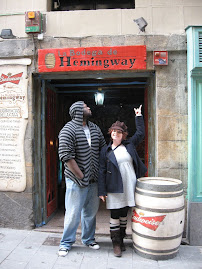So, I'm still reading through Trent's book--due back tomorrow to the library--and here's some important points I've noted thus far:
Interesting note in regard to "idiots" in early 19th century: "Although postrevolutionary Americans might feel humor, sympathy, benevolence, and even admiration for the familiar local idiot, after the panic of 1819 they began to view idiocy with a mixture of curiosity, anxiety, and after the Civil War, fear. This change of perspective--from particular individuals to a general type--began with a major shift in the way Americans dealt with a host of so-called dependents (the unemployed and criminals).
Before 1820, most dependent people (but especially the unworthy) were linked by what was believed to be their common moral frailty. Ignorance, idleness, intemperance, and prodigality, which led to hastily arranged marriages, gambling, frequenting the pawn broker, prostitution, and so forth--were associated with America's depend populations (Society for the Prevention of Pauperism 1818, 3-6). Only their 'worthiness' distinguished one dependent group from the other, and only the worthy received local public assistance. This help usually came in the form of so-called outdoor relief, that is, relief that respectable dependents received in their homes or in the homes of care givers."
So, points to note here--
1. Contemporary contexts to create own shift in regard to "fear" of autism. Catalyst that prompted the contemporary fear--as reflected in media and metaphors used to describe autism? Began in 1990's or so... So, what prompted this newfound fear? More importantly for rhetoric, how specifically is the fear reflected in the media? "Army of autistic children."
My initial answer: I think the Internet has something to do with this fear. Of course, this is just speculative, but I can't help but believe that the availability of resources and information has increased awareness of autism--both for good and bad. Grinker believes in Unstrange Minds that autism rates haven't gone up; rather our awareness of autism has enabled better diagnoses. Availability of information, via the Internet, for starters, in my opinion. But, with information and newly diagnoses cases of autism comes fear of a disability that we know so little about. Add to that the fear of technology... (I'm thinking Katherine Hayles' work on posthumanity might be something to looking into for this sort of discussion. Maybe a later post?)
2. The first paragraph makes for an interesting discussion on "high-functioning" and "low-functioning" autism ("low-functioning" is more typically replaced with "classic" autism). While scholars have noted the connection between "functioning" and productivity (Trent discusses this also on pages 24 and 25), but I'm thinking there's also a connection here between high and low functioning and morality. High-functioning--able to reason "right" from "wrong." Low-functioning--not as clearly discernible. Additionally, the possibility of morality more recognizable/thought in "higher" functioning autistics. Going back to fear here, we fear what we don't know/can't control. If "low-functioning" autistics can't be taught "right" from "wrong," they are potential dangers to society--in theory, of course. I think this morality issue is a relevant one, especially considering my paper for SAMLA on autism and God.
Tuesday, May 15, 2007
Subscribe to:
Post Comments (Atom)








No comments:
Post a Comment